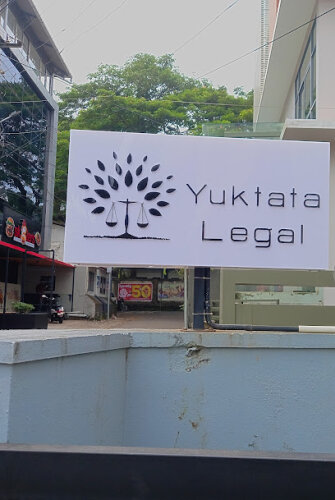Best Dependent Visa Lawyers in India
Share your needs with us, get contacted by law firms.
Free. Takes 2 min.
Or refine your search by selecting a city:
List of the best lawyers in India
About Dependent Visa Law in India
A Dependent Visa in India allows family members of a holder of a valid Indian visa or an Indian national to reside in India. This usually applies to spouses, children, and sometimes parents of the primary visa holder. Dependent Visas are primarily intended to keep families together while the primary visa holder is in India for work, study, or other purposes. The Indian government defines specific eligibility criteria and processes for obtaining a Dependent Visa, aiming to balance the needs of families with immigration control. The duration and conditions of the visa typically depend on the status of the primary visa holder.
Why You May Need a Lawyer
Individuals may need legal assistance for Dependent Visas in various situations. These include:
- Complex Application Process: Navigating through the paperwork and requirements can be daunting, especially if the application involves multiple dependents.
- Visa Rejections: If your Dependent Visa application has been rejected, a lawyer can help understand the reasons and advise on potential next steps or reapplications.
- Legal Compliance: A lawyer ensures that all legal aspects of your application are correctly handled to avoid complications during your stay in India.
- Updates to Immigration Laws: Immigration laws can change, and a lawyer stays updated with these changes and can guide you accordingly.
- Appeals and Hearings: In some cases, you may need to appeal a decision or attend a legal hearing, where an experienced lawyer can represent you.
Local Laws Overview
Key legal aspects relevant to Dependent Visas in India include:
- Eligibility: Family members eligible for a Dependent Visa include spouses, children under a specific age, and occasionally parents. However, the primary visa holder’s status significantly impacts the eligibility.
- Application Requirements: Basic documents required generally include proof of relationship (like marriage or birth certificate), a valid visa of the primary visa holder, and financial statements to ensure means of subsistence.
- Visa Duration: The duration of a Dependent Visa often aligns with the primary visa it is linked to, demanding careful tracking of any changes to the primary visa’s status.
- Work Restrictions: Dependent Visas typically do not grant work rights. Thus, dependents desiring employment must seek appropriate work authorization.
- Renewal Process: Regular renewals might be necessary, requiring compliance with renewal conditions and the submission of updated documents.
Frequently Asked Questions
1. Who qualifies as a dependent for a Dependent Visa?
Typically, spouses and children of the primary visa holder qualify. Some visa categories may also allow parents.
2. Can Dependent Visa holders work in India?
Generally, dependent visa holders are not permitted to work except in cases where specific permission or an employment visa is granted.
3. How long does it take to process a Dependent Visa?
Processing times can vary based on the country of application and specific case details, but it generally takes a few weeks to a few months.
4. Do dependents need to leave India if the primary visa holder's visa is canceled?
Yes, if the primary visa status changes or is canceled, dependents typically must leave unless they secure an independent legal status.
5. What documentation is needed for a Dependent Visa?
You need proof of relationship, the primary visa holder's valid visa, and financial assurances among other documents.
6. Can a Dependent Visa be converted to another type of visa?
Yes, through application to the appropriate authorities, a Dependent Visa can sometimes be converted under certain conditions.
7. Are Dependent Visa holders eligible for Indian healthcare services?
Dependent Visa holders can often access private healthcare, but eligibility for public services depends on specific provisions and regulations.
8. What financial proof is required for obtaining a Dependent Visa?
Applicants typically need to provide bank statements, income proofs, or a sponsorship declaration to demonstrate financial stability.
9. Is a separate application needed for each dependent?
Yes, each dependent must apply separately and meet the stipulated requirements.
10. Can dependents study in India on a Dependent Visa?
Yes, generally, dependents can study; however, they should confirm specific legal stipulations or secure a separate student visa if needed.
Additional Resources
Here are some resources for further guidance:
- Embassy Website: Your country’s embassy in India often provides detailed visa application guidelines.
- Indian Bureau of Immigration: The official site provides updated information on visa categories and regulations.
- Legal Associations: Professional lawyer networks in India offer assistance and legal consultations.
- Official Visa Application Centers: These centers offer processing support and pertinent assistance services.
Next Steps
If you require legal assistance with a Dependent Visa application or related issues, consider taking these steps:
- Consultation: Book an initial consultation with an immigration lawyer to discuss your specific situation and needs.
- Gather Documents: Organize necessary documents such as identity proofs, relationship proof, financial statements, and primary visa details.
- Check Authenticity: Ensure the credibility and experience of the lawyer or legal firm being considered.
- Stay Informed: Keep abreast of any changes in immigration laws or procedures to avoid unexpected issues.
- Track Application: Use official channels to track the progress of your application and respond promptly to any queries or requirements.
Lawzana helps you find the best lawyers and law firms in India through a curated and pre-screened list of qualified legal professionals. Our platform offers rankings and detailed profiles of attorneys and law firms, allowing you to compare based on practice areas, including Dependent Visa, experience, and client feedback.
Each profile includes a description of the firm's areas of practice, client reviews, team members and partners, year of establishment, spoken languages, office locations, contact information, social media presence, and any published articles or resources. Most firms on our platform speak English and are experienced in both local and international legal matters.
Get a quote from top-rated law firms in India — quickly, securely, and without unnecessary hassle.
Disclaimer:
The information provided on this page is for general informational purposes only and does not constitute legal advice. While we strive to ensure the accuracy and relevance of the content, legal information may change over time, and interpretations of the law can vary. You should always consult with a qualified legal professional for advice specific to your situation.
We disclaim all liability for actions taken or not taken based on the content of this page. If you believe any information is incorrect or outdated, please contact us, and we will review and update it where appropriate.
Browse dependent visa law firms by city in India
Refine your search by selecting a city.
















